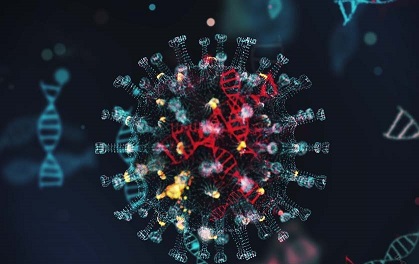Israeli Study Reveals P681 Residue As Key Residue Dictating Cell Fusion and Syncytia Formation in SARS-CoV-2 Variants
COVID-19 News - P681 - Cell Fusion and Syncytia Formation Jun 05, 2023 1 year, 10 months, 1 week, 3 days, 6 hours, 52 minutes ago
Changes within the P681 residue of spike dictate cell fusion and syncytia formation of Delta and Omicron variants of SARS-CoV-2 with no effects on neutralization or infectivity
COVID-19 News: The ongoing battle against the COVID-19 pandemic has been marked by the emergence of various SARS-CoV-2 variants, each posing unique challenges to global health. Among these variants, the Delta and Omicron lineages have garnered significant attention due to their rapid spread and potential vaccine evasion.

A recent study conducted by researchers from Ben-Gurion University of the Negev, the Ministry of Health, Sheba Medical Center, and Soroka Medical Center in Israel has shed light on a crucial residue within the spike protein of SARS-CoV-2 that plays a central role in cell-cell fusion and syncytia formation.
While previous research has extensively explored the Receptor Binding Domain (RBD) of the spike protein and its impact on viral infectivity and vaccine sensitivity, the significance of the 681PRRAR/SV687 polybasic motif within the spike has remained less clear and has not been covered in much studies let alone
COVID-19 News reports.
The 681PRRAR/SV687 motif, also known as the Furin Cleavage Site (FCS), is unique to SARS-CoV-2 and plays a crucial role in viral entry into host cells through a process dependent on TMPRSS2.
The Israeli study sought to investigate the infectivity levels and neutralization potential of the wild-type human coronavirus 2019 (hCoV-19), Delta, and Omicron SARS-CoV-2 pseudoviruses against sera samples collected from individuals four months after receiving a third dose of the BNT162b2 mRNA vaccine.
The findings of the study revealed that the Omicron lineages, specifically BA.1 and BA.2, exhibited enhanced infectivity and a sharp decline in sensitivity to vaccine-induced neutralizing antibodies compared to hCoV-19 and Delta SARS-CoV-2.
Interestingly, mutations within the P681 residue of the viral spike did not affect the neutralization potential or infectivity of the pseudoviruses carrying these mutations. However, the P681 residue played a critical role in the spike protein's ability to promote fusion and syncytia formation between infected cells.
When comparing the cell fusion and syncytia formation abilities of the hCoV-19 (P681), Omicron (H681), and Delta (R681) spike proteins, the study team observed that hCoV-19 and Omicron spikes displayed only modest fusion and syncytia formation, whereas the Delta spike exhibited enhanced fusogenic activity.
Introduction of a single P681R mutation in the hCoV-19 spike or H681R mutation in the Omicron spike restored fusion potential to levels comparable to the Delta spike. Conversely, the introduction of an R681P mutation in the Delta spike abolished efficient fusion and syncytia formation.
Additionally, the study revealed that spike proteins from hCoV-19 and Delta SARS-C
oV-2 were more efficiently incorporated into viral particles compared to spike proteins from Omicron lineages.
The study findings highlighted the role of the P681 residue in cell fusion and syncytia formation, emphasizing its importance in viral pathogenesis.
Overall, this research highlights the critical role of the P681 residue within the spike protein in mediating cell fusion and syncytia formation. These study findings enhance our understanding of the complex mechanisms underlying viral spread and pathogenesis, particularly in the context of emerging variants such as Omicron.
The study findings were published in the peer reviewed journal: Heliyon.
https://www.sciencedirect.com/science/article/pii/S2405844023039579
For the latest
COVID-19 News, keep on logging to Thailand Medical News.
